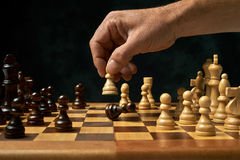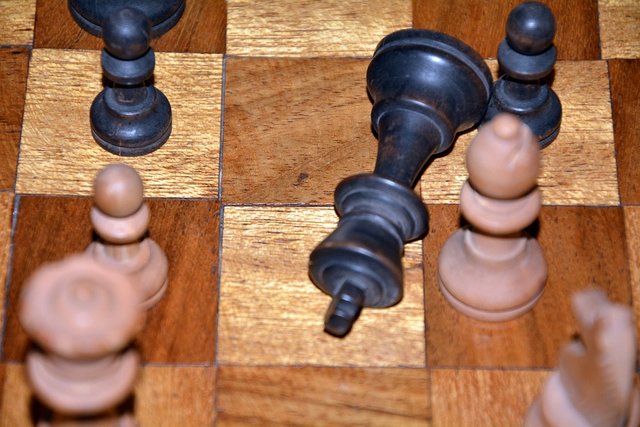Chess and my evolution in logic (featuring @fred703 as author)
BACKGROUND/EVOLUTION
When I started to play chess at the age of twelve or thirteen, I did not realise the impact it would have on the rest of my life.

Up until that point in my life I had been a fairly keen student without really exerting myself. I am a short person so I did not excel at sport in anyway whatsoever. I started to play cricket but then the sports master insisted we bat against James Bell, who was a very good, very fast bowler, without pads to protect our legs. I did not even see the ball he bowled my wickets over with. That was it! Farewell cricket. I also tried my hand again at rugby but in a practice game, a huge fat Portuguese boy named Tasos (who only came to school to play rugby) trampled me into the ground, when I attempted to tackle him , he didn’t even slow down. So farewell rugby! Sadly, I am not a person of courageous demeanour as I always think about the cost/pain of any adventure. My brothers are of a more heroic mould and can endure voluntary pain on the sports fields.
This cowardly aspect of my character troubled me for most of my developing years. Yet my father, who was experienced at contact sports such as rugby and boxing, never condemned me. He used to laugh about when he kitted me out to play rugby when I was a six-year-old at Amalinda Primary. He took me to my first practice and remembered the ball being kicked towards me but I ran straight off the field back to him. Even now I remember the sound of all the boys running towards me to get the ball; it sounded like a stampede and I ran for cover off the field, quite embarrassing. Probably the main reason why I took up boxing when conscripted into the Air force in 1978. When boxing against the army gymnasium, my opponent head-butted me and split my eyebrow open. From then on all the non-commissioned officers used to call me “Little F*@#”, the shortest “troep” (recruit in Afrikaans) with the biggest head diameter (once all the recruits were lined up according to head size to get our hats).
So when chess came along, I had found a game where physical size was irrelevant. I was extremely driven to improve at chess; I used to study/play the game for at least two hours every single day while at high school, from 1973 to 1976. I played at every single opportunity that was presented to me against any opponent, regardless of their playing strength. My family was living in Welkom and I spent two years at Welkom High. My skills grew and I was eventually number 2 in the chess team behind David Roche Kelly, who was my tutor.
Then off to East London where I started at number 50 on the chess ladder of the East London Chess Club, which was right at the very bottom and the rest of that story has already been told.
MENTAL ASPECTS

Now my chess skills were growing, as was my ego, chess gave you such a pleasurable feeling when you beat your opponent. Of course the converse was also true, utter torment when you lost a game. All of these feelings were concealed behind a façade of politeness and civility. I found I could be nice to my opponents while concealing an intense hunger to win. I have always moved extremely quickly (often to my own detriment) and used my opponent’s time to study the position. Accurate thinking in chess is required and those who think weaker than their opponents usually have their flawed logic exposed.
There are two primary types of chess thinkers in my own experience:
- the logical player – the person who makes a move only when they think they have understood the position and their proposed strategy clearly.
- the feel player – does not analyse the board to death but moves often using intuition.
I tend to be more like the second type of player, although there are times when careful analysis is required, particularly when playing the endgame.
The chess game is comprised of 3 main areas, opening, middle game and ending. Many players dislike the ending as there are only a few pieces on the board and precision is required, as well as a deep understanding of the properties of each piece. When I won the Border Open in 1977, my endgame technique was where my superiority was evident.
I will never forget when I played a game against a “patzer” (known as a palooka/beginner) and after I checkmated him, he said to me “If you hadn’t mated me now, I would have checkmated you three moves later!” Really? Quite pathetic logic!

Another development in my character was cynicism, where I could analyse people quite accurately but I was devoid of compassion or a sympathetic interpretation of their motives. I always regarded people with an element of disdain, hidden behind the mask of civility.
Of course feeding my ego required winning and NOT losing. Afterwards the fear of losing made me “retire” from chess, after completing high school, for many years. My main excuse was “Now that I am studying to be an accountant, I do not have time to sit around thinking in my relaxation time.” Another excuse of mine was “I am the top of the pile now and as East London is so isolated from the major chess playing centres, I have nowhere to progress to”. I did continue to play chess casually against friends or people who wanted to have a game. I served a church mission for a couple of years and when some of my American companions used to ask me for a game, I would drive them nuts when I refused to play, telling them that they would just be wasting my time. Of course when I later relented and played them, I always won easily and this made them even more annoyed (I told you I was an egotistical monster in chess).
Aspects of logic surround us in life and it does have some benefits to be a good chess player, but ultimately what value is added to society? Compare the contributions to society between Bobby Fischer and Albert Einstein – Fischer’s IQ was higher than Einstein but when you look at Fischer’s life and how tragically it ended, what did that intellect ultimately help Fischer or society? As you well know, IQ comes in many forms and not just in one form, there are other intelligence dimensions, for example such as emotional, financial, spiritual and social.
I try to be a religious person in my conduct and I do not believe there should be any conflict between religion and science. However, in so many aspects of society and particularly religion, I see a great deal of illogic and poor thinking. One cannot just hide behind the phrase “It is one of the mysteries of God” when in fact most religious values are merely an extension of medieval thinking.
In 2007 I got a job as the financial manager in an Italian multinational company in Uitenhage. My family remained in Johannesburg, so I was by myself in Uitenhage. A chap by the name of Kevin Fourie befriended me and I was privileged to be a part of his family’s life for several years. Kevin loved chess even though he was not too good at it. He had an extremely intelligent mind and we could converse about many subjects. He remembered that I used to play chess about twenty years ago, and his excitement and passion was so infectious that it got me going again with the noble game.
One fairly amusing incident was when I played chess with one of my squash mates, Neil Thomas. I boasted to him that he would never beat me after we had played a lot of games together. He wanted to know what the stakes were. I said “if you ever beat me, I will run through the squash club from one end to the other dressed only in my underpants. It must be understood that sports clubs are a social hub for small communities where the entire family congregate on regular occasions. Several weeks later when we were playing a game, the unthinkable happened! Neil was jumping up and down like a crazy monkey bellowing his house down in laughter and shouting the bet at me. So when I was at the club on a busy league night, I stripped down in the men’s change rooms but Neil said I don’t have to go through with it. Tempting, but a bet is a bet, right? So off I trotted through the crowd with a resigned air about me. Men smiled and women frowned at the disturbing sight while Neil and a few cronies were crowing behind me. The risk of a big mouth was clearly exposed that day.
TODAY
I will never regain those chess heights when I was a school boy, but I love playing chess on the internet.
Age has taught me to be kinder to people and not just divide them into chess players and non-chess players. It has also taught me to just enjoy chess, to take a chance, risks are worth trying, even if you lose. I chat to my opponents from all around the world and find out about their lives.
With computers having developed past all human skill levels, these computers help young people evolve faster into grandmasters than ever before. Even if man is no longer smarter than machines, they will achieve heights never seen before.
don't forget to follow @fred703
I think one of the transferable skills of playing Chess, is being able to have a large working memory which can reorganise very quickly. Being able to plot the potential moves ahead requires that large and flexible working memory, and also happens to be something widely attributed to people with traditionally high IQ.
Most people I have met who are Chess Masters also excel in at least one other skillset. Of course, without tenacity, those who work really hard could potentially catch up provided the guys with natural flare remain complacent.
I think you have chosen a good path to enjoy playing Chess, there are so many stories (even movies) about chess players who have very damaged personal lives due to over investing their time into trying to be the absolute best.
thanks for some good insights. I think I must do a follow up as the commentators here have raised some excellent aspects I now remember
Ah, chess! I haven't played it very often, but every time I do I get a better understanding of game mechanics... but more importantly for me, I get to see myself and how my perception interacts on a relational level.
FWIS (from where I stand), relationships are what dictate my experience... and having logic without intuition is like having honesty without compassion: it is a cold, brutal, and mechanical perspective that sees life in a competitive format where one must win at all costs... When I've worn it, I see other human beings as adversaries who are in direct competition with me. I lose humility, I lose empathy, and I lose out on one of the most important aspects being alive: enjoying healthy relationships with myself, my neighbors, and the world at large.
I would say I'm closer to the second type of player outlined in this article (obviously!): the intuitive one. I enjoy logic (and use it when applicable) but for me, I'd rather risk being considered an intuitive fool than a logical success... Of course, I didn't always have this perspective...
As a child, I was super-competitive... And while losing was truly a world-ending scenario for me and my emotions, winning was even worse: I experienced zero joy in it and, if anything, only felt temporary relief in the fact that I wasn't a failure... which, of course, could change at any moment.
I had to walk away from competitive games for many years before I was able to return to them in earnest. I had the opportunity to play golf very cheaply for a few years, and I learned to see things in a different manner because of it. I saw that one isn't necessarily playing against their opponent - but rather they are playing against the course itself (...and maybe their past record - if one is into that "evolution" stuff and the "self-improvement" standard). As I was playing, I would ask myself: Am I doing my best? Am I accepting of how I am playing - regardless of if it is "good" or "bad" in comparison? And (most importantly!), am I enjoying myself as the course tests me in my relationship with myself?
After that, I was able to re-enter the world of competitive games - including the logic driven game of chess. Nowadays, I'm not driven to be "the best" in comparison with other players. I play to get a better understanding of game dynamics, and I play to get a better understanding of myself...
...Because? The prior will serve me in future moments I get to play the game again - while the latter serves me in the present moment I am experiencing right now.
And... what time is it ever other than right now? ;-)
Many of these reflections have reminded me of much of my sporting life, not that I was at your level most probably, I reckon my rating was mid 1900's at my peak. thanks for the insights.
What @sweetssj said and also being able to think many moves ahead while still minding the present one.
@ fred703 I dont think its smart or fair to characterize there as only being two "types" of chess players in the way that you have. Maybe its a matter of perspective, if I had to divide all chess players into two groups I would say they would be separated by those who play to win, and those who play to learn. When you play a lot of chess you realize that different games can have different subjects, one person might not ever get off the same subject until he can advance to the next. Other people might choose a subject based on the aptitude of the enemy and more importantly their perception of the amount of effort or time that will be needed to win. These subjects and knowing how best to counter them are various positional patterns that are applied largely out of book theory. Theories can often bear the burden of predictability, once you spot a pattern you have to recognize the theory and use your advanced knowledge to mitigate its effect, but make no mistake, this is by no means intuition. Every game a player looses it is because the game passed a certain point of no return. Every good chess player looses, and this is how you learn, but this experience of having having hope in a situation where your opponent has knowingly passed this point can be maddening, In chess as well as life.
Chess is a game of memory and pattern recognition. Logic has little to do with it. The only difference between the players is experience and the varying levels of these two abilities. Intuitive players rely on intuition because either their working memory is not on par, or they don't recognise the patterns at play. The logic of chess is actually extremely rudimentary, and all humans possess this ability to an adequate degree.
but the varying abilities to integrate logic into their thinking varies skill levels also. it is interesting the varying degrees of integrating logic and intuition. that makes chess so fascinating.
I love the fairness and cleanness of chess.
My 6 year old is just starting to get into it, he's determined to beat me and I'm using it to teach him about dedication.
It'll take a long time for him to get good enough, but I can't wait :)
such good fun. I wanted my kids to learn the basics on their own before I would engage but it was too daunting for them I suppose. I should have helped them I suppose. I shouldn't have expected them to do what I did.